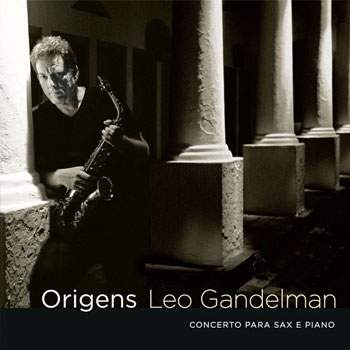Leo Gandelman - 1987

Going back to the origins, in the case of Leo Gandelman, is above all remembering those Saturday and Sunday mornings when, as a boy, he was woken up by the music that came from the living room, where his mother played with friends or worked with her students; his father, conductor Heinrich Gandelman, also helped to make music a constant presence. And it is not by chance that Leo describes the musical moments as the most special of his childhood. Moments in which I did not participate only as a listener. The piano he studied since he was little, but not only. With the recorder, he was a soloist with the Brazilian Symphony at the age of 15 – and, in a group dedicated to baroque music, he even played the viola da gamba.
A concert career seemed the natural path – but, perhaps because of the rebelliousness of adolescence, he would end up elsewhere. Leo was a photographer, worked with cinema. Until the music called him back, now with the saxophone. He went to the US, studied composition at Berklee. He returned to Brazil in the late 1970s, dedicating himself to jazz and instrumental music – and the rest is history: or rather, one of the most remarkable chapters in the history of Brazilian music. As an arranger, producer and saxophonist, he worked on more than 800 recordings, in addition to eleven solo albums, recorded from the end of the 80’s, which lead to something like 500,000 copies sold during his career.
The classical past seemed to be dormant when, in 1999, he received an invitation from conductor Silvio Barbato, then in charge of the Symphony Orchestra of the National Theater of Brasília: to be a soloist in Villa-Lobos’s “Fantasia para Saxofone e Orquestra”. Projects from the following years – and the performer’s desire to continue venturing into this repertoire – are perhaps the best testimony to the success of the undertaking. Leo began to act as a soloist alongside groups such as the São Paulo State Symphony and Petrobras Symphony, with which he even recorded Radamés Gnatalli’s “Concertino”, conducted by Isaac Karabtchevsky. He also established a partnership with the pianists Estela Caldi and Maria Teresa Madeira, with whom he formed a regular duo that allowed him to systematically work on the classical repertoire for saxophone and piano.
Taking all this into account, it is possible to understand “Origens” in two different ways, which dialogue with each other: the record is both a privileged portrait of the artist’s recent work and a return to his origins in music. Leo selected for the album fundamental composers of Brazilian concert music in the 20th century – Villa-Lobos, Ernesto Nazareth, Chiquinha Gonzaga and Radamés Gnatalli –, in addition to the French Jacques Ibert. In addition to the historical moment, there is a common feature that unites them in a particular way: the freedom with which they worked with the most different musical materials in the creation of their works, from elements of folklore and popular music to the main genres of the Western musical tradition.
He also transited, throughout his career, between the erudite and the popular, it is tempting to define Leo Gandelman as the ideal interpreter of these works. The reasoning, in itself, is not wrong – and the artist’s musical experience certainly prepares him in a special way for this repertoire. But the excellence of his interpretation has other and more important justifications. The sensitive construction of the melodic lines in Villa-Lobos; the virtuosity that never gives up musicality at Ibert; the construction of the musical atmospheres of Gnatalli’s “Brasiliana”; the loose and engaging musicality in Nazareth and Chiquinha Gonzaga – all these elements show knowledge of the score, the specific language of each author and, above all, the ability to dialogue with them in an extremely personal way. Above any label, this is, after all, what is expected of the great artist – and that gives him the ability to reinvent the repertoire to which he dedicates himself.
Joao Luiz Sampaio.
Repertoire: Fantasia For Soprano Saxophone, Concertino For Alto Sax, Brasiliana 7, Four Songs From The Amazon Forest, Brejeiro, Gaucho (Corta-Jaca).